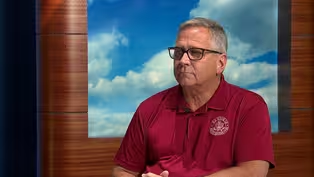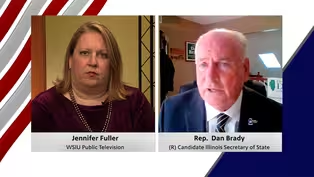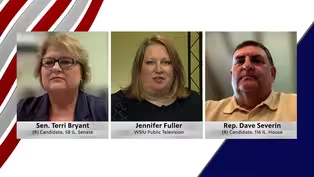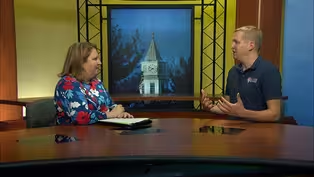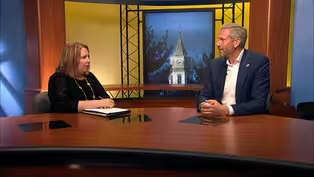Meet the Candidates
Illinois Governors Race, J.B. Pritzker
9/29/2022 | 26m 27sVideo has Closed Captions
WSIU’s Jennifer Fuller interviews Democratic Governor JB Pritzker.
Democrat JB Pritzker is seeking re-election as Governor of Illinois. In this episode of Meet the Candidates¸ WSIU’s Jennifer Fuller talks with Gov. Pritzker about his first term, and what he would hope for if he wins another term in office.
Problems playing video? | Closed Captioning Feedback
Problems playing video? | Closed Captioning Feedback
Meet the Candidates is a local public television program presented by WSIU
This series is produced in partnership with the League of Women Voters
Meet the Candidates
Illinois Governors Race, J.B. Pritzker
9/29/2022 | 26m 27sVideo has Closed Captions
Democrat JB Pritzker is seeking re-election as Governor of Illinois. In this episode of Meet the Candidates¸ WSIU’s Jennifer Fuller talks with Gov. Pritzker about his first term, and what he would hope for if he wins another term in office.
Problems playing video? | Closed Captioning Feedback
How to Watch Meet the Candidates
Meet the Candidates is available to stream on pbs.org and the free PBS App, available on iPhone, Apple TV, Android TV, Android smartphones, Amazon Fire TV, Amazon Fire Tablet, Roku, Samsung Smart TV, and Vizio.
Providing Support for PBS.org
Learn Moreabout PBS online sponsorshipMore from This Collection
Meet the Candidates features interviews with candidates running for Illinois State, House and Senate races. Guests will discuss key issues impacting Illinois voters such as the economy, the environment, education and public health. This series is produced in partnership with the League of Women Voters.
12th U.S. Congressional Seat Rep. Mike Bost
Video has Closed Captions
12th U.S. Congressional Seat Rep. Mike Bost (27m 3s)
12th U.S. Congressional Seat Homer "Chip" Markel
Video has Closed Captions
12th U.S. Congressional Seat Homer "Chip" Markel (27m 14s)
118th Illinois State House, Rep. Paul Jacobs and Van Ikner
Video has Closed Captions
118th Illinois State House, Rep. Paul Jacobs and Van Ikner (25m 16s)
Illinois Secretary of State Race Candidate Dan Brady
Video has Closed Captions
Illinois Secretary of State Race Candidate Dan Brady (26m 46s)
58th Senate and 116th House General Election
Video has Closed Captions
State Sen. Terri Bryant (R-Murphysboro) and State Rep. Dave Severin (R-Benton) (27m 2s)
Illinois Treasurer General Election Tom Demmer
Video has Closed Captions
Sit down with Republican State Representative Tom Demmer. (25m 47s)
Illinois Treasurer General Election Michael Frerichs
Video has Closed Captions
Sit down with Democrat Michael Frerichs, who is seeking re-election. (26m 46s)
115th and 117th IL. House District General Candidate Forum
Video has Closed Captions
115th and 117th IL. House District General Candidate Forum (27m 13s)
Providing Support for PBS.org
Learn Moreabout PBS online sponsorship(upbeat music) (orchestral music) - Welcome to Meet the Candidates.
I'm Jennifer Fuller.
Our guest is Governor J.B. Pritzker who is the democratic nominee for governor running for reelection in this November's election.
Governor, thanks for joining us.
- Thanks Jennifer.
Glad to be here.
- Let's let you get started with a brief introduction of sorts.
Tell us a little bit about your time so far in office and why you're running for reelection.
- Happy to do so.
I'm running for reelection because we need a government that puts people first and addresses the kitchen table issues, most important to working families.
After years of mismanagement, I balanced four budgets in a row, paid off all the states overdue bills and got six credit upgrades.
And as a result, we're providing $1.8 billion in gas, grocery, and property tax relief.
I protected a woman's right to choose.
I passed the largest infrastructure bill and state history, lowered the cost of prescription drugs, expanded access to affordable healthcare and raised the minimum wage to a living wage.
And I accomplished all of that while fighting through a deadly global pandemic saving lives and livelihoods.
And I'm doing my job, so working families can do theirs.
I'm very proud of the progress that we've made here in Illinois, and I'm ready to get even more big things done for our people.
- Many of your predecessors had legislative experience before they moved into the executive branch.
You came in with a different perspective.
Can you talk a little bit about your work with the legislature and the challenges that you've overcome?
- Happy to.
I'm proud of what we've been able to achieve in just four years.
We've accomplished major bipartisan wins including tax cuts for 400,000 small businesses and our Rebuild Illinois Infrastructure plan which is putting people to work in Southern Illinois, in Central Illinois, on projects such as the Kaskaskia Port, Rend Lake Resort and the Casino at Walker's Bluff.
Working with Democrats in the general assembly, we've enacted four balanced budgets that eliminated our multi-billion dollar bill backlog and of course earned six credit upgrades, more to come I'm hoping and thanks to smart budgeting and fiscal responsibility.
We've been able to provide tax relief for families across the state.
Lowering the cost of prescription drugs, expanding broadband internet across the state, expanding scholarships for college students, providing new investments in vocational training.
Those are all things that I've done working with the legislature to get these things.
These are big things.
They're hard things to get done, but as a result of the partnership that I've achieved with Democrats and on occasion Republicans too, we've been able to really advance the state.
- I imagine one of the larger challenges that you face as governor of state like Illinois is the vast difference between major urban areas, including the city of Chicago and vast rural areas and the agricultural needs outside of the larger cities.
Can you talk a little bit about that balance?
- Well, I really believe that we are one Illinois.
Since day one, I've worked tirelessly to serve all of Illinois and grow our rural and downstate communities just like we're growing our urban communities.
My campaign collected petition signatures from all 102 counties, and I've traveled to every corner in the state as governor and on the campaign trail.
I know that agriculture is the engine of Illinois's economy, the number one industry.
And it's why I promise to make it a priority in my administration and I have.
Farmers have struggled through a pandemic, through extreme flooding and market volatility.
And I've worked to ensure that they have the resources that they need to deal with those challenges head on.
We've opened new markets for our crops around the world.
We're rebuilding our crumbling roads and bridges to ensure that we can get our goods to where they need to go in the world.
And we're funding programs like SIU's Farm Family Resource Initiative to address the mental health needs of farmers throughout the state.
As long as I'm governor, the agriculture industry will be able to rely on the state for support, and anyone who's growing a business in our state, knows that I was a businessman before I became governor.
I'm a believer in growing our economy.
And I'm excited about helping people all across the state and have been doing that for the last four years.
- You mentioned the initiative that Illinois is one Illinois, one state.
There are still those who see different parts of the state as almost an us versus them.
How would you address concerns that some areas of the state perhaps get more support from state leaders or more attention?
- Well, I will say that I know that some people feel that way, but I think for the first time in decades as a governor, I have actually focused on areas outside of Cook County and even the collar counties to make sure that people across the state are getting their fair share.
Think about the infrastructure bill that we passed where more than half of the investments that are being made in our roads and bridges and airports are being made in places outside of Chicago, outside of the collar counties.
I'm very proud of, I talked about some of the projects that we've invested in at Rend Lake, for example, Kaskaskia.
And don't forget we're building a new port in Cairo, and these are all projects that are priorities of mine that I've made possible through the capital bill.
And I'm very proud of the fact that I've been working to bring people together.
I think there are others who believe that Illinois ought to be thought of as regional differences.
And the reality is we have more in common than we have differences, and I've been working to make sure that people understand that, but I'm a governor that works for every part of the state.
- Let's dig a little deeper into the economy.
There are those who would say that Illinois is bad for business.
We hear this from time to time kind of a two part question here.
Do you agree Illinois is bad for business and what are you doing?
Or what would you do to make things even better for those businesses?
- Well, we've been growing the economy in Illinois and let's acknowledge of course, that things are challenging right now having just come through a deadly global pandemic and of course, global inflation is hurting Illinois families.
But from day one, I've been committed to growing our economy and raising wages.
And I've done just that.
I cut taxes on 400,000 small businesses.
We've created more small businesses than ever before under my administration.
And I raised the minimum wage to a livable wage.
Jobs, wages, bringing in businesses that I think is a principle role of a governor and it's exactly what I've been doing.
Google, Ferrara Candy, Kelloggs, and many other world class companies have decided to call Illinois home and grow new jobs here.
And I'm saving taxpayers money, growing high paying jobs and making our economy work for everybody.
I'm pleased with the direction of things that the incentives that I've helped to put in place.
For data centers have brought in $13 billion of investment, incentives for electric vehicle manufacturing have helped Rivian and other companies grow in the state.
And I'm very proud of the work that we've done to attract new businesses.
So I look forward to four more years of growth.
- On a more personal economic level.
You mentioned inflation, and there are a lot of families who continue to struggle with high costs for gasoline, food, housing, energy, all of of those things that they need day to day.
What initiatives would you put in place that would help those people meet their day-to-day needs?
- Well, I'll remind you that when I ran for governor in 2018, I told Illinois that I would get our fiscal house in order.
And I did just that.
And, we need to acknowledge that families are hurting right now for reasons that are beyond all of our control.
And, but it's because of the balanced budgets that I passed and the surplus that we've run that my administration's been able to offer substantial relief to taxpayers right now that helps them with the challenge of inflation.
My fourth balance budget in a row is delivering $1.8 billion in tax relief for gas groceries, and property taxes.
In addition to making unprecedented payments to shore up our pensions, to lower the future cost of pensions and to build up our rainy day fund.
Raising the minimum wage to $15 an hour, that's helping families overcome inflation.
Now there's still more work to do, but every day, we're fighting to help taxpayers save more money and to make sure that we're growing job opportunities and wages across the state, all of which is good for attacking the problem of inflation that so many families are dealing with.
- There's been a lot of criticism of the recently past SAFE-T Act.
And there are a lot of people that are criticizing your administration when it comes to crime across the state and particularly in the city of Chicago.
Can you tell us a bit about what you like about the SAFE-T Act and are there things that you think need to be changed?
- Well, there's a lot of Republican propaganda and outright disinformation that's circulating online right now and in advertising about the SAFE-T Act and about crime.
As its name implies, the SAFE-T Act is designed to improve public safety.
The system that Republicans are defending allows for rapists and murderers and domestic abusers to buy their way out of jail.
That's the system Republicans are defending.
The SAFE-T Act will allow judges to keep those violent criminals in prison.
If you wanna take a measure of it, it's why the organizations that represent those who are victims of crime, of violent crime were supporters and are supporters of the SAFE-T Act.
Keeping those violent criminals in jail is vital.
But a single mother down on her luck shoplifting a few $100 worth of diapers and formula, maybe condemned to months in jail because she can't come up with $500 bail.
That isn't a fair system.
And that is what we're trying to change.
If you wanna reduce crime, you have to solve crimes.
And the SAFE-T Act provides law enforcement with the tools to do just that.
And I've added hundreds of new state police eliminated the rape kit backlog and built state-of-the-art crime labs to provide law enforcement with the tools and technology they need to quickly solve crimes.
In fact, we've eliminated the rape kit backlog and gotten to many of the cases that require DNA analysis because of the investments that I made.
Republicans voted against that.
Darren Bailey voted against that.
If you wanna address the root causes of crime and that's really important, you've gotta address poverty.
And that's why I'm investing in violence prevention programs and mental health and substance abuse treatment and youth job programs.
And once again, the Republicans voted against all of that.
- One of the areas that statistics show helps in bringing down crime and reducing poverty is increasing access to education.
And higher education across the state in particular is continuing to claw its way back from years of reduced funding at the state level.
What are your plans for higher ed and how would you help bring them back to a higher level and hopefully decrease costs for students and their families?
- Well, under the prior Republican governor, higher education funding dropped dramatically, and that really did hurt those institutions.
And I've reversed that entirely.
Everyone deserves a quality education and the ability to pursue their dreams.
And I've taken steps to make our higher education and workforce development programs more affordable and accessible for everyone.
We're investing in our K12 and higher education systems by addressing the teacher shortage by dedicating over $400 million in funding toward deferred maintenance projects at colleges and raising teacher salaries.
And of course I've added $1.3 billion to K12 education just would point out that U.S. News & World Report just named Illinois the number one state among the most populous states in the country for pre-K to 12 education.
We're seeing more students finish high school in Illinois and we've increased college scholarships by 50% to an historic high of $600 million.
We're helping 26,000 more students than before gain scholarships.
Over half of whom are first generation college students.
And now we're able to provide scholarship assistance to every student who applies.
And we've made sure to expand vocational and workforce training opportunities, very important.
Statewide, we've done that by dedicating over a billion dollars in funding to help train the workforce of the future and provide our young people with jobs.
There are great good paying jobs that don't require one to go to college or take on college debt.
And I'm certainly encouraging many people who choose not to go to a four year university to take advantage of those workforce and vocational opportunities.
In a second term, I wanna make college free for students from working class and middle class families.
And there's a lot more work to do of course to lift up education in the state but we're on a great path.
- I wanted to ask a little bit more deeply about the students who'd like to go into a trade rather than a traditional higher education track.
What more do you think you could do whether it's through K-12 education or even some trade schools to help those students and those people who'd rather go directly into a career?
- Well, I maybe agree with the premise of the question.
There are a lot of people who will choose not to go to a four year university and we wanna give them the opportunity to go learn a trade.
And guess what?
We've done just that.
In fact we've expanded in our college scholarship program, the MAP grant program, the ability of of community college students to access those dollars, and we've provided supplemental funding for students to deal with things like transportation, childcare.
Many of the people who go to community college need those services in order to be able to get through and get the degree that they need for the trade that they're looking for.
And of course, we've partnered with labor unions and other educational organizations so that people who don't go to community college can still learn a trade whether it's becoming a laborer, a welder, anything else that doesn't require a college education, we want to assist people in accessing those opportunities.
And I have to say in Illinois today, there are so many of those jobs available.
They are looking for apprentices everywhere in Illinois.
So anybody who is looking should apply.
- One of the things that we continue to see headlines about deals with the care for our most vulnerable residents whether it's in veterans homes, Department of Human Services, Department of Children and Family Services and there has been some criticism about the oversight in those agencies in your administration.
What have you done and what would you continue to do to clean up some of the problems within those agencies?
- Well, let's start by addressing DCFS.
DCFS has historically been terribly underfunded and dropped the number of staff there over years, reduced the number of staff and services.
And prior to my tenure, the agency had 13 directors over 12 years resulting in instability that exacerbates the challenges that already existed.
The responses by previous governors was always the same.
Fire the director to signal change but then not do the hard work to fix things.
And that's not leadership, that's scapegoating.
And I refuse to scapegoat the good people who work at DCFS.
It won't improve the agency and it doesn't solve the issues at hand.
So instead of significantly increased our DCFS budget but very importantly, brought in world class renowned childcare and child welfare experts to improve the agency.
We eliminated the backlog as a result of their recommendations.
We eliminated the backlog when people call in to report, abuse or neglect.
We launched retraining of every single employee from the top of the organization to the bottom.
And we started an aggressive hiring program.
Making progress at DCFS though is not like flipping a light switch.
It's painful and it's frustrating, it takes some time and a lot of effort and resources but it's additionally painful that our most vulnerable children are being used as political paws by my opponents.
There's a lot more to do with this agency but Republicans are all talk and no action.
They voted against all of the resources to reform DCFS every year that we've made those proposals.
Now just briefly on the LaSalle Veterans Home.
Look, every life that was lost during the pandemic was tragic.
And especially the seniors who died at the LaSalle Veteran Home.
Let's remember that this happened during the peak of the pandemic prior to the advent of vaccines.
And at a time when Republicans were telling people not to wear masks or to follow the advice of doctors.
And I called for an independent investigation by the inspector general to identify shortcomings at the home to hold people accountable and to protect our veterans.
And we did just that.
But let's be clear, if we had followed the recommendations and advice of my opponent, Darren Bailey, there would've been no mitigations and frankly, thousands, potentially tens of thousands more people would've died.
- I wanted to follow up just a bit with some recent more recent news, particularly involving the Choate Mental Health and Rehabilitation Center and some mismanagement and in many cases abuse going on, at least alleged abuse going on there.
What are you working on in terms of the oversight at facilities like that?
- Well, first we were sure to provide transparency for the agencies that were examining the wrongdoing at Choate so that people would be held accountable and they are being held accountable.
Second, of course, replacing those people with people who are actually dedicated to the real work that needs to get done for the developmentally disabled, for anybody that's at Choate and our other agencies too, to make sure that we have the quality of care that's necessary.
But it's very important to me that we continue to hold people accountable.
And my view is that if organizations homes like that can't be managed properly, and I believe they can't, but if they can't, then obviously we're gonna need to make real changes in the way we serve people.
But right now, I think we're focused on making sure that the patients, that the people who are at at Choate, the residents get the services and the care that they need.
- You've talked a lot about the issues and priorities within the state of Illinois.
The state though is not an island.
So you have to work with your counterparts both here in the Midwest and across the country.
Can you talk a little bit about that working relationship and what you would expect if you were elected to another term?
- Sure.
Let me start by talking a little bit about the challenges today with various states, particularly in our neighborhood.
Inspired by my mother, I've supported women's reproductive rights my entire life and I will not ever let up on that.
And I won't stand idly by while the states around us controlled by Republican legislators or by Republican governors, try to relegate women to second class citizen status.
Here in Illinois, abortion is safe and legal and accessible.
And as long as I'm governor, it's gonna stay that way.
I reach across the aisle and reach across borders to work with states, all across the United States.
I did that, certainly I think demonstrably to people during the worst parts of the pandemic.
There were a number of us who worked together, particularly here in the Midwest, Michigan, Wisconsin, Kentucky, working with Illinois, trying to make sure that on a regional basis we were keeping people safe and healthy.
And I'm proud of the fact that Illinois has one of the highest vaccination rates in the Midwest and one of the lowest mortality rates in the Midwest.
And that's in part because I reached out to so many governors in the region and also across the nation to make sure that we were doing best practices for the state of Illinois.
And we did and saved thousands of lives and got our state back on track faster than otherwise we could have.
- In just a few minutes remaining.
You mentioned earlier the increases in the credit ratings for the state and that you'd hoped that that would continue.
What new priorities would you put in place to try and keep those credit ratings moving up rather than moving down?
- Well, let's start with, we need to balance the budget every year.
There were two years before I became governor under the prior Republican governor in which we had no budget at all.
And we saw what that did $17 billion of bill backlog, eight credit downgrades our universities experienced five credit downgrades.
And I don't have to tell you the kind of damage that that did.
So balancing the budget which is what I've done every year, all four years of my term.
And it allows us to finally rebuild state government to overcome the challenges of a hollowed out state government that was left to me when I came into office, and to provide tax cuts and tax relief for working families in Illinois.
So again, highest priority, making sure that we're taking care of our fiscal matters in the state appropriately.
And I have to say, it's Democrats that have done that.
Republicans talk a lot about fiscal responsibility but it's Democrats that pass balanced budget.
Republicans voted against every one of those budgets.
So we need to continue to be prudent in the way we spend, we need to continue to grow the economy because that helps us bring revenue into the state jobs, raise wages and so on.
And that's all good for our fiscal situation and continuing to head in the right direction.
- Governor J.B. Pritzker, the democratic nominee running for reelection in the governor's race in Illinois.
Governor, thanks so much for your time.
- Thanks, Jennifer.
Good to talk to you.
- And you can find all of WSIUs Meet the Candidates interviews by going to our website, wsiu.org and you can find us on our YouTube channel as well.
WSIU-TV.
We'll join you next time for Meet the Candidates.
Until then, I'm Jennifer Fuller.
Thanks for joining us.
(upbeat music)

- News and Public Affairs

Top journalists deliver compelling original analysis of the hour's headlines.

- News and Public Affairs

FRONTLINE is investigative journalism that questions, explains and changes our world.












Support for PBS provided by:
Meet the Candidates is a local public television program presented by WSIU
This series is produced in partnership with the League of Women Voters

